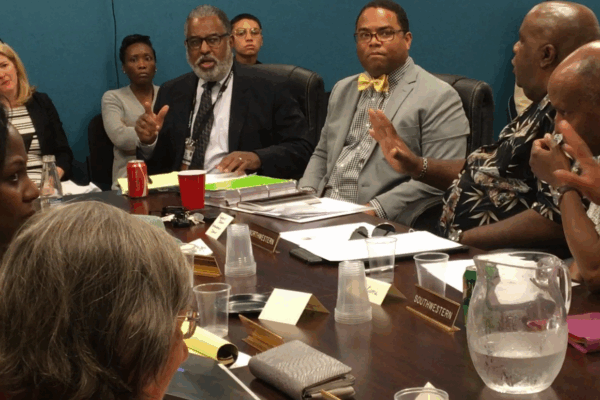ACLU Letter to Mayor Pugh Raises Serious Legal Concerns with Decisions Limiting Authority, ACLU Letter to Mayor Pugh Raises Serious Legal Concerns with Decisions Limiting Authority, Gagging Board Members
BALTIMORE – Taking action to defend the ability of Baltimore’s Civilian Review Board (CRB) to operate independently and transparently, the American Civil Liberties Union (ACLU) of Maryland is urging Baltimore Mayor Catherine Pugh to reconsider recent decisions making the CRB part of the City’s Law Department and demanding CRB members sign a restrictive confidentiality agreement that blocks them from communicating with the public about their work. The ACLU letter to Mayor Pugh also asks that she appoint independent counsel for the CRB, pointing out the conflict inherent in having the CRB overseen by the same lawyers who represent the Baltimore Police Department (BPD).
“The ACLU is extremely concerned that Baltimore City’s actions are undermining, rather than strengthening, the Civilian Review Board’s ability to provide residents with the transparency and accountability they demand, and these actions fly in the face of recommendations by the Department of Justice and Community Oversight Task Force,” said Dana Vickers Shelley, Executive Director of the ACLU of Maryland. “City officials must learn from the deaths of Freddie Grey and Tyrone West, the Gun Trace Task Force scandal, and the death of Detective Suiter, that the goal should be to empower the Civilian Review Board to help, not restrict and silence it.”
In its letter, the ACLU, a non-voting member of the CRB, expresses deep concerns about recent attempts by the City of Baltimore, through the City Solicitor, to limit the CRB’s access to Baltimore police records, to limit the CRB’s ability to operate transparently, and to limit the CRB’s ability to communicate with the public and other interested parties, such as the Department of Justice (DOJ) or the Monitor appointed to oversee the consent decree between the DOJ and the Baltimore Police Department. None of the City’s demanded changes for the CRB are required by law. And all of the changes are inconsistent with the City’s past practice, as well as with public demands for greater transparency, accountability, and civilian oversight of the BPD, including in the recent report by the Civilian Oversight Task Force:
- The CRB has been told that they cannot subpoena records from the BPD. Instead, the CRB must request those records under the Maryland Public Information Act (MPIA), like any other member of the public. This runs directly contrary to the CRB’s legal authority to subpoena records, and the CRB’s entitlement to the BPD records.
- The City Solicitor has told the CRB that they cannot access BPD Internal Affairs records other than the casebook for the complaint under investigation, even if the records are relevant to either the CRB’s investigation (such as records of past complaint investigations as to help evaluate the officer’s credibility) or to its recommendations regarding discipline (which requires knowing an officer’s disciplinary history). This again ignores the CRB’s state statutory authority to subpoena records.
- The CRB has been told that all communications from the Board to DOJ must come through the City Solicitor’s office. It is not clear on what authority the City claims to be able to censor the communications of CRB members, since the CRB is created by state law.
- The City, through the City Solicitor, has demanded that CRB members sign an excessive confidentiality agreement, asserting that all information disclosed to the CRB is confidential, and thus cannot be discussed in public, even though Maryland law demands that the CRB conduct its meetings in public.
Go to the ACLU of Maryland website to see the letter to Mayor Pugh: www.aclu-md.org
###
Stay Informed
Sign up to be the first to hear about how to take action.
By completing this form, I agree to receive occasional emails per the terms of the ACLU’s privacy statement.
By completing this form, I agree to receive occasional emails per the terms of the ACLU’s privacy statement.


